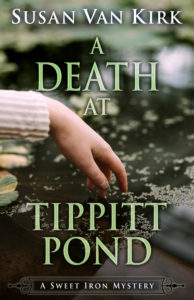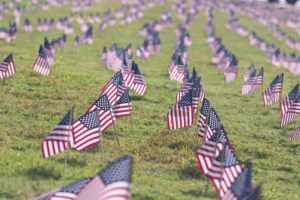A Death at Tippitt Pond (A Sweet Iron mystery) will be launched this June, beginning a new chapter in my writing life and a  new series involving mystery, history, and genealogy. The main character, Beth Russell, is a historical researcher and genealogist. For reasons I won’t mention—no spoilers—she has been researching the genealogy of the Tippitt family, and she has access to their huge mansion, Tippitt House.
new series involving mystery, history, and genealogy. The main character, Beth Russell, is a historical researcher and genealogist. For reasons I won’t mention—no spoilers—she has been researching the genealogy of the Tippitt family, and she has access to their huge mansion, Tippitt House.
Because the story takes place during the era when I was young, I wanted to include the Vietnam War in my book. It was such a huge presence in our lives.

Photo by Andrew Pons at unsplash.com
I have my own memories of that war. Besides the newspaper headlines and stories, I watched the news without end while I was in college and thereafter. Our college campus was also filled with protests, discussions, debates, anger, and loud voices. Once, while on a plane to San Francisco, I encountered soldiers my age who were eager to talk about their time in Vietnam—well, talk about some of their time in Vietnam. And, like many others, I lost friends in that war. 58,000+ American soldiers and an estimated 200,000-250,000 South Vietnamese soldiers died.
Because of this, I felt it was important to portray that event in my mystery, a story in the present day, but connected to the past. I created a character named Jeff Tippitt, whose bedroom in Tippitt House was left just as it had been in that time. The reader learns that the young Tippitt heir died in Vietnam, and the sorrow of that death was only part of the tragedy the Tippitt family experienced.
So how to portray a person who isn’t actually alive in the story? Beth Russell opens the door to his bedroom, and it is a time capsule of the past, as well as an indicator of what Jeff was like. She examines a photograph on his desk, a young soldier with a crew cut, not a ponytail. Dressed in a flak jacket with various belts and pockets, he posed in front of a helicopter. The photo was creased in multiple places as if he had carried it in one of those pockets.
“Did he think he was invincible? Did he figure he would come home to his sisters and his parents? Was it an adventure?”
His dog tags, a religious medal, and a cigarette lighter, its inscription rubbed off, lay on the desk with the photograph. How

photo by Abbas Jamie at unsplash.com
many times must he have carried these with him, possibly while his helicopter was under attack? Next to the desk was a bookshelf with Life Magazines, their covers filled with peace symbols and photos of soldiers. No Autobiography of Malcom X or Herzog, but a dog-eared copy of Catch-22, a corner turned back, must have been returned with his possessions. So he was a bit of a rebel?
A wooden box, its glass top revealing a flag folded into a triangle, rested on the chest of drawers. One wooden corner held a metal rectangle with Jeff’s name, army unit, and the date and location of his death.
“When his parents and his sisters left the cemetery with this flag, pain and grief must have walked on either side of them. Beth wondered what they thought of him volunteering like that when he was so young. Did they argue with him? Were they proud?”
These brief reminders of a person’s life are enough to bear witness to a war that was raging about the time Beth Russell was born. While she didn’t live through that time, as a researcher she understands how these objects reflect the lives of so many of the young soldiers who were part of that war.
Later, she searches through her genealogy bases and discovers the cold facts that aren’t reflected by those much-loved and carried objects:
Jefferson Webster Tippitt
Born, 5 June 1948 in Sweet Iron, Illinois
Died 6 June 1967 in Ben Suc, Vietnam

As someone born in 1947, I am haunted by Vietnam. As a poor kid without a college exemption, I would have likely been drafted. But I hate the good luck to be female. One of my classmates from GHS class of 1965, was killed when he stepped on a land mine. One of my husband classmates from the class of 1961, was an air force pilot and died when his plane was shot down. Another classmate had to watch her husband slowly die from the effects of Agent Orange–he was a helicopter doorgunner. These are the things that we carry in memory.
You are certainly right about that, Judith Squires! I lost a good friend from Knox College who was in ROTC. As always, I wrote a story about it for my teaching memoir. It was sure a horrible time, and a perfect example of how class differences meant you went or you stayed. I thought I should mention this war in my novel, but it doesn’t have a huge part in it. The character who went could have received an exemption, but he chose not to, as many other people I knew. I just shake my head at what a time that was.
This new book sounds so enticing, Susan.
Yes, we watched it on the news from the safety of Canada, as we welcomed the draft evaders. Still today I know women who have lived here since the Sixties, when they accompanied their partners across the border.
I’m looking forward to reading it.
Wow! Women who have lived in Canada since the 60s… That, in itself, would be an interesting story. In light of the current climate in this country, it’s nice to remember the days when people could debate and discuss. But I would be misleading if I indicated my new novel is about Vietnam. That provides a context and a historical event that influenced the family in this story. As my editor often says, “Stop researching history and write your mystery.” The emphasis is on the mystery, but the history provides a context for events and characters. Thanks for your kind comments!